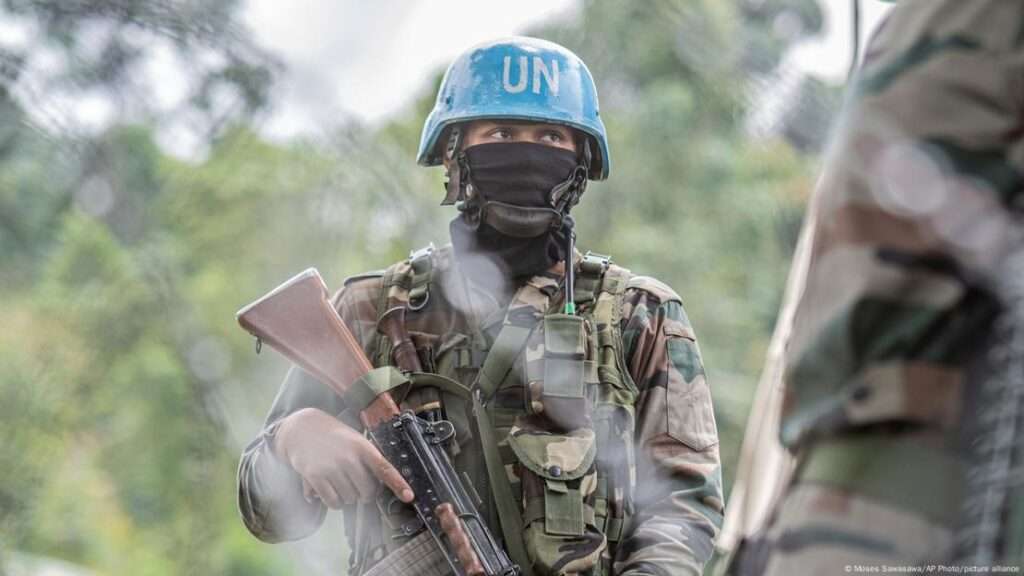Colonel Romuald, a retired French paratrooper, could have spent his retirement in peace after 36 years of service in countries like Mali, Kosovo, and Afghanistan. Instead, he now leads a delicate and dangerous mission in Goma, the capital of North Kivu province in the Democratic Republic of Congo (DRC).
Romuald heads a team of 20 at Agemira, a Bulgarian private security firm advising the Congolese army in its fight against the Rwandan-backed M23 militia.
Agemira’s work includes strategizing against the rebels, maintaining aircraft and drones, supplying troops, and facilitating arms deals. Many of its staff, like Romuald, are retired military officers from Europe.
Alongside Agemira, the DRC government has enlisted the Romanian private military company “RALF,” comprising 800 fighters, primarily veterans of the French Foreign Legion.
Together, these foreign groups play a crucial role in safeguarding Goma and the strategic town of Sake, where the threat from M23 rebels remains ever-present.
Romuald sees their mission as just: “Rwanda is occupying DR Congo in violation of international law, stealing its raw materials, and forcing millions to flee,” he said, referencing the coltan mine in Rubaya, a key resource for the tech industry.
Romuald’s dedication is personal. “I told my wife I wouldn’t return until the refugees could go home,” he shared. Earlier this year, he predicted the M23 occupation would end by 2024, but ongoing fighting and failed peace negotiations with Rwanda have tempered his optimism.
The colonel attributes the Congolese military’s struggles to a lack of discipline and the superior tactics of the Rwandan forces. Despite his frustrations, Romuald and his team remain committed to their advisory and logistical roles, refraining from direct combat.
While Agemira staff earn between $5,000 and $6,000 per month — many times more than the few hundred dollars paid to Congolese soldiers — this disparity has fueled resentment.
Onesphore Sematumba, a Congolese analyst at the International Crisis Group, called the treatment of local soldiers “a bit racist,” pointing out that while foreign officers stay in comfortable accommodations and use modern equipment, Congolese troops often endure harsh conditions.
These frustrations came to a head earlier this year when several RALF soldiers temporarily left the DRC due to delayed wages.
Although the issue was resolved, the incident highlighted broader challenges in managing the complex coalition of local and foreign forces.
A Patchwork of Forces in North Kivu
Despite their efforts, critics question the efficacy of foreign veterans like those at Agemira and RALF. “These highly paid people are not really making a difference,” Sematumba said, acknowledging their role in defending urban centers but noting their limited impact in rural areas.
The conflict in North Kivu involves a crowded field of actors, including the Congolese army, UN peacekeepers (MONUSCO), Southern African Development Community (SADC) troops, East African Community soldiers, Burundian forces, and local militias.

Despite this extensive presence, the M23 continues to expand its hold on the mineral-rich region.
Romuald and his team are quick to distinguish themselves from mercenaries. “We are not mercenaries,” he insisted, explaining that Agemira staff don’t carry weapons. RALF personnel, while armed, only engage defensively if strategic locations like Goma or Sake come under attack.
European laws against mercenarism add another layer of scrutiny. “As soon as we start behaving like mercenaries, they will arrest us,” Romuald noted, referring to monitoring by French and Romanian intelligence agencies.
Despite these challenges, Romuald frames his work as both professional duty and adventure: “It’s my job, and it’s an adventure,” he said, underscoring his commitment to the mission.
The stakes in North Kivu remain high as the Congolese government struggles to balance international support, local military efforts, and the persistent threat of the M23.
While foreign veterans like those at Agemira and RALF offer valuable expertise, their presence also highlights the challenges of reliance on external forces in a deeply complex conflict.
For Romuald and his team, the fight in Goma is more than a job, it’s a commitment to a cause they believe is just, even as the path to peace remains uncertain.
READ ALSO: Regina Daniels Shares More Photos From Graduation Ceremony























